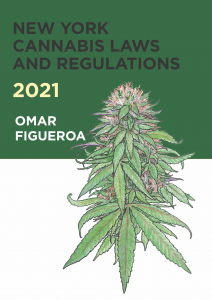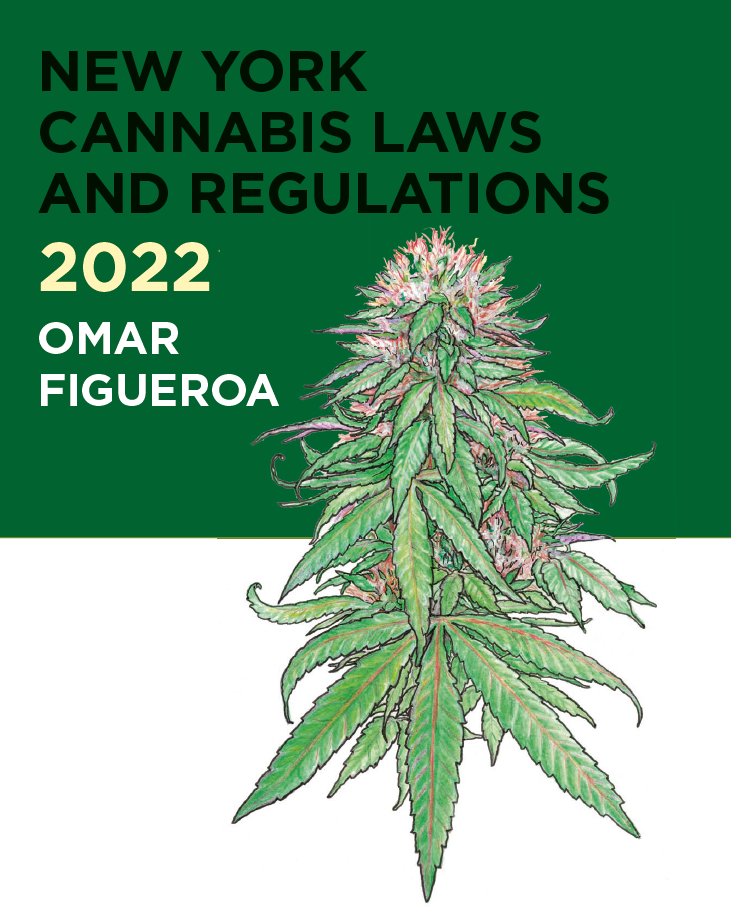New York
Attorney Omar Figueroa, Esq. (Licensed in California)
- Graduate of Yale College and Stanford Law School
- Wrote “the book” on New York’s Cannabis Laws and Regulations
|
|
|
| New York Cannabis Laws and Regulations (2021 Edition) |  |
RECENT BLOG POSTS
OVERVIEW OF NEW YORK LAW
The Marijuana Regulation and Taxation Act (MRTA) was signed into law on March 31, 2021 with profound effects on state-legal cannabis in New York. Aside from creating a new cannabis and hemp regulatory body, the MRTA also created a framework for adult-use cannabis business licenses, updated the rules for medical cannabis and hemp markets, and legalized the personal possession and use of cannabis (within limits).
Although adult-use licenses likely will not be available until the second half of 2022 (see below), now is the time to become familiar with this new framework, and prepare for the license application process.
Below is a brief overview of New York’s commercial cannabis and hemp laws.
New Agency and Regulators:
New York State has a new cannabis regulator: the five-member Cannabis Control Board (“CCB”) and the Office of Cannabis Management (“OCM”).
The CCB will oversee the new regulations implementing MRTA, while the Office of Cannabis Management (“OCM”) will implement the license application processes and monitor licensees for compliance.
The CCB also appointed a Chief Equity Officer charged with establishing a robust social and economic equity program to prioritize the licensing of members of communities disproportionally impacted by the War on Drugs.
Additionally, New York will have an eighteen-member state cannabis advisory board.
Adult/Recreational-Use Cannabis:
The MRTA creates nine primary license types for the adult-use (or “recreational”) market: cultivator, nursery, processory, distributor, cooperative, microbusiness, retail dispensary, onsite consumption, and delivery.
The new law sets a goal of 50% of these licenses to social and economic equity applicants, including women-owned and minority-owned businesses, distressed farmers, and applicants disproportionately impacted by the “War on Drugs.” The CCB will establish criteria for awarding these licenses, including under the MRTA’s social and economic equity provisions.
But first, the CCB must promulgate implementing regulations, and that will take some time. The draft adult-use regulations are expected to be published for public comment early this year (2022), and then interested applicants are encouraged to submit public comment once they are promulgated. CCB Chairwoman Tremaine Wright recently said CCB’s aims to make the first adult-use license applications available by September 2022 (within 18 months of MRTA’s passage), if not sooner.
Future adult-use business applicants should be making preparations now to submit strong applications once they become available, including:
- Forming a limited liability entity
- Identifying real estate that will be suitable under local law
- Building a team, including the use of employment contracts
- Securing adequate capital finance
- Retaining professional help, including accountants, bookkeeping, and legal
- Developing a business plan and budget
Medical Cannabis:
New York passed its medical marijuana law in 2014 to serve the needs of certified patients. Under the MRTA, certified patients include persons under the continuing care of a medical practitioner who find the person is likely to receive “therapeutic or palliative benefit from the primary or adjunctive treatment with medical use of cannabis” for a diagnosed medical condition.
Only “registered organizations” (ROs) may produce and dispense medical cannabis, and presently there are ten (10) ROs in New York, each with four dispensing locations. (The complete list is available here.) Under the MRTA, the CCB will register additional registered organizations to provide services to unserved and underserved areas of the state. Like with adult-use applications, the CCB will actively promote racial, ethnic, and gender diversity when approving additional registered organizations.
Cannabinoid Hemp and Hemp Extract:
Federal law permits production of hemp under the Agriculture Improvement Act of 2018 (2018 Farm Bill). Last year, New York submitted a state plan to USDA that became effective on January 1, 2022. Under the New York State Hemp Program, hemp growers may apply to the New York State Department of Agriculture and Markets for a three-year license to cultivate hemp.
Separately, businesses that process (extract cannabinoids and/or manufacture final cannabinoid hemp products), distribute, and/or sell at retail hemp or cannabinoid hemp products also need cannabinoid hemp permits. The Cannabinoid Hemp Program will continue to operate under the Department of Health until the new Office of Cannabis Management is operational.
Recently, the CCB proposed updates to the Cannabinoid Hemp Program ’s that open new opportunities and lower barriers to entry for CBD and other hemp-product businesses. These regulatory amendments include allowing CBD in food and beverages up to certain thresholds, creating a “craft” designation for certain hemp products, and revising product labelling requirements. Public comments on these proposed amendments may be submitted until March 7, 2022.
Conclusion
In crafting its cannabis laws, New York wisely incorporated lessons learned from other adult-use legal states, such as California.
But, just like in other states, New York’s cannabis and hemp laws are intricate, and remaining compliant with ever-changing laws and regulations can be burdensome.
Services provided by The Law Offices of Omar Figueroa, Inc., P.C.
- Permitting, Licensing & Regulatory Compliance
- Business and Corporate Law
- Intellectual Property
- Cannabis, Hemp, and Psychedelics
The information on this page is not intended to, nor should be construed as, legal advice. Reading this page does not create an attorney-client relationship. For specific legal questions, please contact the Law Offices of Omar Figueroa to schedule a confidential consultation. This page may constitute an attorney advertisement. Andrew Kingsdale is licensed in New York and California, and is the attorney responsible for this advertisement. Prior results do not guarantee a similar outcome.

